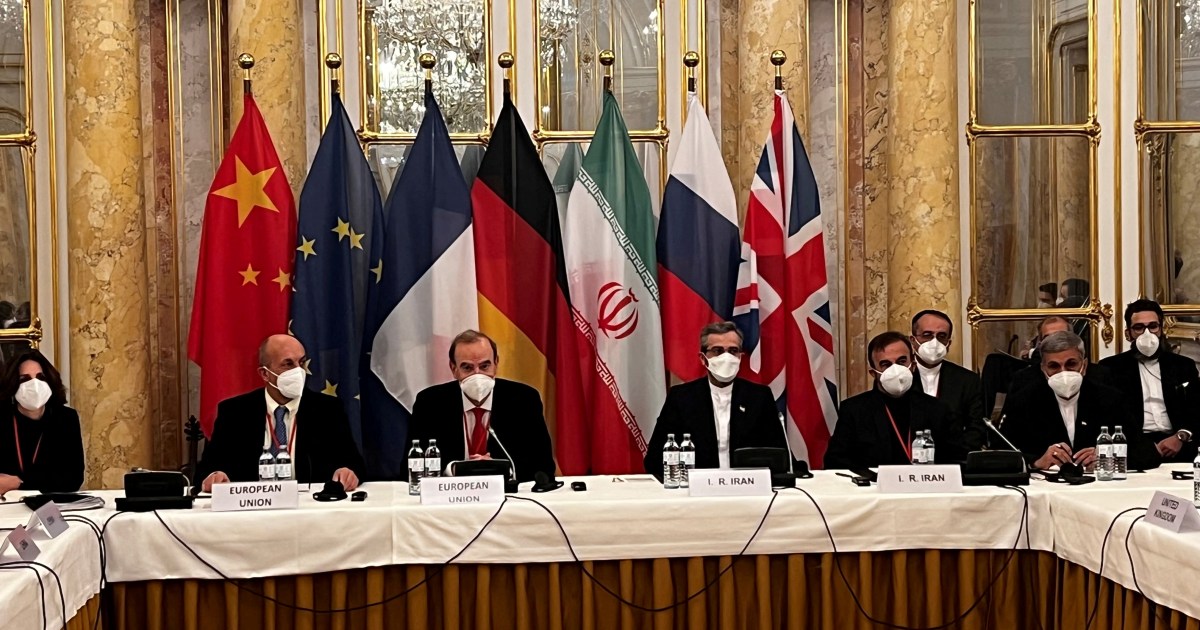A source familiar with the talks taking place in Vienna said today, Friday, that there are a large number of issues in several areas that remain unresolved in the indirect talks between Iran and the United States aimed at reviving the 2015 nuclear deal, amid Russian, European and Iranian cautious optimism about reaching an agreement. agreement in the coming period.
"In every part of the (incomplete) paper that outlines an agreement, there are issues that are still being studied," the source told reporters, adding that although negotiations were moving in the right direction, "there is no time."
This came at a time when observers talked about the progress of negotiations to save the international agreement on the Iranian nuclear deal quietly behind closed doors in Vienna.
Sources close to the Vienna negotiations said that the heads of delegations will return to the capitals of their countries for consultations, but the experts will continue their work.
The discourse began to change after a difficult start. Talks began of "efforts", "progress" and a "positive path", although the West continues to denounce the "slowness" of the path in light of Iran's continued development of its nuclear program.
Iranian Foreign Minister Hossein Amir Abdollahian said that "we have received unofficial messages from Washington that carry good words, but they lack practical initiatives."
Meanwhile, Al-Jazeera correspondent quoted a source close to the Vienna negotiations as saying that any final understanding will be implemented through stages that take months.
Sources close to the Vienna negotiations told Reuters that the negotiators had reached the stage of precise details, which is the most urgent stage.
The European Union's foreign and security policy chief, Josep Borrell, indicated that there is a possibility of reaching an agreement with Iran in the Vienna negotiations, and the atmosphere is better than it was.
Today, Friday, Borrell said that the atmosphere for negotiations to revive the international nuclear agreement with Iran has become "better" than it was before the end of the year, pointing to the "possibility" of reaching an agreement in Vienna "in the coming weeks."
"The atmosphere is better after Christmas; before that I was very pessimistic, and today I think there is a possibility of an agreement," Borrell said after a meeting of foreign ministers of the 27 member states of the European Union.
He indicated the possibility of reaching a "final outcome" in the "coming weeks", adding that "I still hope that the agreement can be reformulated and implemented."
Russia announced today, Friday, that it is "optimistic" about international talks aimed at reviving the Iranian nuclear deal, pointing out that "progress" has been made on this sensitive issue.
Russian Foreign Minister Sergei Lavrov said that there is real progress in the Vienna negotiations on reviving the Iranian nuclear agreement, noting that Western countries have gone beyond the issue of discussing the missile program and Iran's actions in the region. Lavrov called on Tehran to be realistic and constructive in the negotiations, as he described it.
After a first round of sessions from April to June in Austria, meetings resumed last November 29 between the various countries that are still parties to the agreement officially called the "Joint Comprehensive Plan of Action", the European trio Germany and France. And the United Kingdom in addition to China, Russia and Iran.
The negotiations are keen to return Washington to the agreement that it withdrew from in 2018 during the era of former President Donald Trump, and to return Tehran to respecting its commitments that it stopped working on in response to the re-imposition of US sanctions.
Cautious optimism
Sergei Ryabkov, Deputy Russian Foreign Minister, described the negotiations as "accelerated", adding that "the chances of reaching a solution have increased."
That was also the view of Tehran, which praised the current desire of all negotiators to reach a "credible and stable agreement."
Washington also retreated from its extreme pessimism that it showed last month, and recorded, through its Foreign Ministry spokesman, Ned Price, that "modest progress" has been achieved, but warned that "this is not enough."
The various sides refuse to set a deadline, but Westerners keep repeating that "time is running out".
US Secretary of State Anthony Blinken warned Thursday that there were only "a few weeks left."
If the talks fail, Blinken said, "we will discuss other steps and other options" with US allies "in Europe, the Middle East and beyond."
"We are ready for either track," he added.
The commander of the US Fifth Fleet stressed that overcoming the threat of Iran is to strengthen deterrence and partnerships in the region, indicating that Tehran is the most dangerous threat he sees in the region.
French Foreign Minister Jean-Yves Le Drian also stressed that negotiations with Iran are proceeding slowly, and that the time has come to resolve the negotiations.
Le Drian pointed out that Iran must conclude these negotiations, or else everyone will enter into a crisis, as he put it.
Cancellation of penalties
On the other hand, Iranian President Ibrahim Raisi said that his government has put serious follow-up on the abolition of sanctions at the top of its agenda, and that it has not postponed its efforts to thwart these sanctions while awaiting the results of negotiations with the West in Vienna.
Raisi added - in a tweet - that despite the embargo conditions, current oil sales have increased and his country no longer has any concern that oil revenues will return to it.
In his statement Thursday, Raisi said that the country's non-oil exports have risen 40% in recent months.
Raisi confirmed the end of previous problems in the field of exports, adding that the region's markets are good, and there is a willingness to buy Iranian goods in various countries of the world, he said.
Iranian Foreign Ministry spokesman Saeed Khatibzadeh said recently that the atmosphere of optimism in the Vienna talks on the Iranian nuclear file resulted from the will of all negotiators to reach a "reliable and stable agreement."

